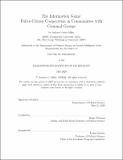| dc.contributor.advisor | Roger Petersen. | en_US |
| dc.contributor.author | Miller, Andrew Cesare. | en_US |
| dc.contributor.other | Massachusetts Institute of Technology. Department of Political Science. | en_US |
| dc.date.accessioned | 2020-11-24T17:32:14Z | |
| dc.date.available | 2020-11-24T17:32:14Z | |
| dc.date.copyright | 2020 | en_US |
| dc.date.issued | 2020 | en_US |
| dc.identifier.uri | https://hdl.handle.net/1721.1/128634 | |
| dc.description | Thesis: Ph. D., Massachusetts Institute of Technology, Department of Political Science, May, 2020 | en_US |
| dc.description | Cataloged from student-submitted PDF version of thesis. | en_US |
| dc.description | Includes bibliographical references (pages 312-339). | en_US |
| dc.description.abstract | Criminal groups -- gangs, mafias, and drug cartels, among others -- | en_US |
| dc.description.abstract | likely cause more deaths than interstate war, insurgency, and terrorism combined. This violence and the lack of accountability for perpetrators present a major challenge to states' central mandates of providing public safety and administering justice. States fall short of their mandates, in part because they struggle to gain cooperation from citizens. This study is about what I call The Information Game: the competition between the police, which want citizens to come forward with information about violence, and criminal groups, which want citizens to stay silent. I present cycle of silence theory, which posits that collective misperceptions prevent communities from reaching their full potential of police-citizen cooperation. Akin to terrorism, fear generated by criminal group violence makes retaliation appear to be more likely than it is. | en_US |
| dc.description.abstract | The violence has the underappreciated but potent second order effect of pushing citizens who are willing to cooperate to hide their disposition from others. Cooperation thus appears to citizens to be less of a norm than it is. I also take new methodological approaches -- namely, fielding the first large-scale virtual reality experiment -- | en_US |
| dc.description.abstract | to test realistically and ethically strategies aimed at promoting cooperation. The results show that providing access to anonymous tip lines, creating awareness of community cooperation norms, and in some circumstances, exposing citizens to police officers of the same ethnicity increase citizen information-sharing with the police. Employing a multi-method research design, this study draws on original surveys in Baltimore, Maryland (N=650) and Lagos, Nigeria (N=1,025) as well as proprietary survey data of criminal justice experts (N=2,700) and citizens (N=109,000) in 113 countries provided by the World Justice Project. I pair the quantitative analysis with first-hand observation as well as interviews with more than 150 citizens, state authorities, and criminal group affiliates. | en_US |
| dc.description.statementofresponsibility | by Andrew Cesare Miller. | en_US |
| dc.format.extent | 339 pages | en_US |
| dc.language.iso | eng | en_US |
| dc.publisher | Massachusetts Institute of Technology | en_US |
| dc.rights | MIT theses may be protected by copyright. Please reuse MIT thesis content according to the MIT Libraries Permissions Policy, which is available through the URL provided. | en_US |
| dc.rights.uri | http://dspace.mit.edu/handle/1721.1/7582 | en_US |
| dc.subject | Political Science. | en_US |
| dc.title | The information game : police-citizen cooperation in communities with criminal groups | en_US |
| dc.title.alternative | Police-citizen cooperation in communities with criminal groups | en_US |
| dc.type | Thesis | en_US |
| dc.description.degree | Ph. D. | en_US |
| dc.contributor.department | Massachusetts Institute of Technology. Department of Political Science | en_US |
| dc.identifier.oclc | 1221003830 | en_US |
| dc.description.collection | Ph.D. Massachusetts Institute of Technology, Department of Political Science | en_US |
| dspace.imported | 2020-11-24T17:32:13Z | en_US |
| mit.thesis.degree | Doctoral | en_US |
| mit.thesis.department | PoliSci | en_US |
